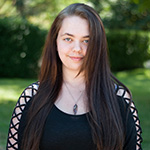Preservation Team
This kind of digital preservation work is not undertaken alone. Reconstituting the trAce Online Writing Centre archives involved a team of seven people with a wide range of specialties. It was led by Dr. Dene Grigar, the Director of the Electronic Literature Lab and a scholar and artist of electronic literature who participated in many of the events and activities offered by trAce and knew firsthand many of the people involved in the community. Working with her is Professor Nicholas Schiller, a digital librarian at Washington State University Vancouver who also serves as the Associate Director of the Electronic Literature Lab. Both Grigar and Schiller are pursuing certification for the Digital Archive Specialist through the Society of American Archivists.
Assisting them were four undergraduate researchers. Katie Bowen, the project manager for the student team, also served as the liaison to artists and writers. Mariah Gwin produced the archival website and developed its content. Austin Fields and Holly Slocum were in charge of reconstructing frAme, fixing links, organizing the file structure, and testing the work for accessibility.
In all endeavors of the Electronic Literature Lab we find Greg Philbrook, who serves as the technical support person. He was the point person for moving the data from Nottingham Trace University to the Electronic Literature Organization and took the lead on setting up the archival site at the ELO’s Repository at Compute Canada.
Bios
 Dene Grigar is Director of the Creative Media & Digital Technology Program at Washington State University Vancouver, whose research focuses on the creation, curation, preservation, and criticism of Electronic Literature, specifically building multimedial environments and experiences for live performance, installations, and curated spaces; desktop computers; and mobile media devices. She has authored 14 media works, such as “Curlew" (with Greg Philbrook, 2014), "A Villager's Tale" (with Brett Oppegaard, 2011), the "24-Hour Micro-Elit Project" (2009), When Ghosts Will Die (with Steve Gibson, 2005), "Fallow Field: A Story in Two Parts” (2004), and “The Jungfrau Tapes: A Conversation with Diana Slattery about The Glide Project” (2004), as well as four scholarly books and over 50 articles. She also curates exhibits of electronic literature and media art, mounting shows at the Library of Congress and for the Modern Language Association, among other venues. She serves as Associate Editor for Leonardo Reviews and is President of the Electronic Literature Organization. Her website is located at http://nouspace.net/dene.
Dene Grigar is Director of the Creative Media & Digital Technology Program at Washington State University Vancouver, whose research focuses on the creation, curation, preservation, and criticism of Electronic Literature, specifically building multimedial environments and experiences for live performance, installations, and curated spaces; desktop computers; and mobile media devices. She has authored 14 media works, such as “Curlew" (with Greg Philbrook, 2014), "A Villager's Tale" (with Brett Oppegaard, 2011), the "24-Hour Micro-Elit Project" (2009), When Ghosts Will Die (with Steve Gibson, 2005), "Fallow Field: A Story in Two Parts” (2004), and “The Jungfrau Tapes: A Conversation with Diana Slattery about The Glide Project” (2004), as well as four scholarly books and over 50 articles. She also curates exhibits of electronic literature and media art, mounting shows at the Library of Congress and for the Modern Language Association, among other venues. She serves as Associate Editor for Leonardo Reviews and is President of the Electronic Literature Organization. Her website is located at http://nouspace.net/dene.
 Nicholas Schiller is the Associate Director of the Electronic Literature Lab and a member of the library faculty at Washington State University Vancouver. He is also on faculty with the Creative Media & Digital Culture program where he teaches information structure and leads workshops on search engine optimization. He has published and presented on a variety of topics including current efforts to preserve and archive early works of electronic literature, metaphor and structure in information literacy instruction, and learning in video games as a model for library instruction. He is a previous contributor to the ACRL Tech-Connect blog. He is teaching a course in born digital documentation at the 2018 Digital Humanities Summer Institute in Victoria, B.C.
Nicholas Schiller is the Associate Director of the Electronic Literature Lab and a member of the library faculty at Washington State University Vancouver. He is also on faculty with the Creative Media & Digital Culture program where he teaches information structure and leads workshops on search engine optimization. He has published and presented on a variety of topics including current efforts to preserve and archive early works of electronic literature, metaphor and structure in information literacy instruction, and learning in video games as a model for library instruction. He is a previous contributor to the ACRL Tech-Connect blog. He is teaching a course in born digital documentation at the 2018 Digital Humanities Summer Institute in Victoria, B.C.
 Katie Bowen is the Document Specialist for the Electronic Literature Lab at Washington State University Vancouver (WSUV). She is pursuing a B.A. in Digital Technology and Culture with a minor in Psychology. In Fall 2018 she will graduate magna cum laude. With the Electronic Literature Lab she has presented at Implementing New Knowledge Environments (INKE), a Digital Humanities conference in Victoria B.C.. With the team, she won second at Showcase for Undergraduate Research and Creative Activities (SURCA) for her project. In addition, as a team they won first at Research Showcase at WSUV for their work. She was a contributing author to the upcoming Rebooting Electronic Literature. Her plan after graduation is to focus on project management and web development.
Katie Bowen is the Document Specialist for the Electronic Literature Lab at Washington State University Vancouver (WSUV). She is pursuing a B.A. in Digital Technology and Culture with a minor in Psychology. In Fall 2018 she will graduate magna cum laude. With the Electronic Literature Lab she has presented at Implementing New Knowledge Environments (INKE), a Digital Humanities conference in Victoria B.C.. With the team, she won second at Showcase for Undergraduate Research and Creative Activities (SURCA) for her project. In addition, as a team they won first at Research Showcase at WSUV for their work. She was a contributing author to the upcoming Rebooting Electronic Literature. Her plan after graduation is to focus on project management and web development.
 Mariah Gwin is the Games Research Assistant for the Electronic Literature Lab at Washington State University Vancouver. She is pursuing a double B.A. in Digital Technology & Culture and English with certificates for Games Studies & Design and Professional Writing. She is expecting to graduate in the Spring of 2020. With the Electronic Literature Lab she has presented at Implementing New Knowledge Environments, a Digital Humanities conference in addition to having presented at research showcases to spread the results of the Traversal project. She was also a contributing author to Rebooting Electronic Literature. Her focus nests primarily in writing as well as front-end web development, content creation and design.
Mariah Gwin is the Games Research Assistant for the Electronic Literature Lab at Washington State University Vancouver. She is pursuing a double B.A. in Digital Technology & Culture and English with certificates for Games Studies & Design and Professional Writing. She is expecting to graduate in the Spring of 2020. With the Electronic Literature Lab she has presented at Implementing New Knowledge Environments, a Digital Humanities conference in addition to having presented at research showcases to spread the results of the Traversal project. She was also a contributing author to Rebooting Electronic Literature. Her focus nests primarily in writing as well as front-end web development, content creation and design.
 Austin Fields is currently an Undergraduate Researcher for the Electronic Literature Lab. He is pursuing a B.A. in Digital Technology and Culture with a certificate in Game Studies & Design. Austin has a focus on front-end design as well as digital marketing and will graduate in Fall 2018 as Team Leader for the Web Development team in the CMDC’s Senior Seminar. He served as the Social Media Coordinator for the CMDC program in 2017-2018.
Austin Fields is currently an Undergraduate Researcher for the Electronic Literature Lab. He is pursuing a B.A. in Digital Technology and Culture with a certificate in Game Studies & Design. Austin has a focus on front-end design as well as digital marketing and will graduate in Fall 2018 as Team Leader for the Web Development team in the CMDC’s Senior Seminar. He served as the Social Media Coordinator for the CMDC program in 2017-2018.
 Holly Slocum is currently an undergraduate researcher for the Electronic Literature Lab. She is pursuing a B.A. in Digital Technology and Culture with a minor in Communications. Holly has a focus on front-end web development and content creation. Her recent projects include the development of interactive modules for the OER DTC 101 textbook and the reconstitution of the journal frAme, published by trAce Online Writing Centre, 1999-2001.
Holly Slocum is currently an undergraduate researcher for the Electronic Literature Lab. She is pursuing a B.A. in Digital Technology and Culture with a minor in Communications. Holly has a focus on front-end web development and content creation. Her recent projects include the development of interactive modules for the OER DTC 101 textbook and the reconstitution of the journal frAme, published by trAce Online Writing Centre, 1999-2001.
 Greg Philbrook is a graduate of the Creative Media & Digital Culture Program and now works as the program's technical and instructional technician. In this position, he manages the program’s computer labs and web server, heads student workshops, and collaborates with faculty on numerous projects. As a developer, he has built both the preservation catalog for the Electronic Literature Lab and the program’s inventory system, worked with Dene Grigar on “Curlew,” and created the interface for “Sound Spheres” with John Barber. He has also served as the technical support at exhibits curated by Dene at the Library of Congress, Electronic Literature Organization conferences, and Digital Humanities Summer Institute in Victoria, B.C.
Greg Philbrook is a graduate of the Creative Media & Digital Culture Program and now works as the program's technical and instructional technician. In this position, he manages the program’s computer labs and web server, heads student workshops, and collaborates with faculty on numerous projects. As a developer, he has built both the preservation catalog for the Electronic Literature Lab and the program’s inventory system, worked with Dene Grigar on “Curlew,” and created the interface for “Sound Spheres” with John Barber. He has also served as the technical support at exhibits curated by Dene at the Library of Congress, Electronic Literature Organization conferences, and Digital Humanities Summer Institute in Victoria, B.C.